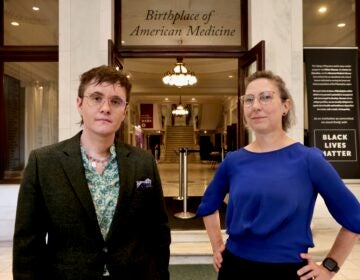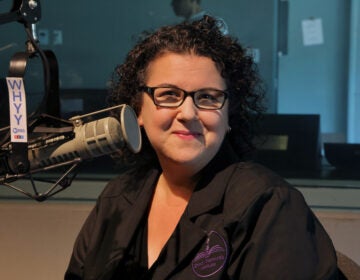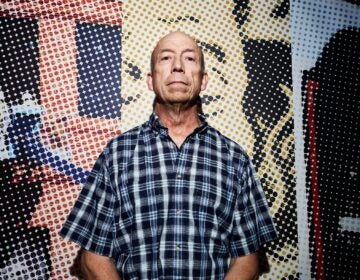After 2 years of controversy, Mütter Museum announces new human remains policy
The new policy comes after two years of controversy involving public backlash, staff departures and high-level leadership changes.
From Philly and the Pa. suburbs to South Jersey and Delaware, what would you like WHYY News to cover? Let us know!
The Mütter Museum has announced a new policy for how it will handle human remains in its collection.
The medical history museum will continue to show human remains in its collection, but with a new approach to focus more on the lives of patients and how medical history has changed over time.
The Mütter Museum is a well-known Philadelphia institution and prominent attraction that draws more than 100,000 visitors a year, using the tagline “disturbingly informative” to describe its collection of medical instruments, anatomical models and specimens. However, the museum has been mired in controversy for the past two years due to public backlash over the museum’s now-former executive director removing all online exhibits and videos in the name of an ethical review, staff departures and high-level leadership changes that made local and national headlines.
Sara Ray, the museum’s senior director of interpretation and engagement, said the question isn’t simply about whether the museum should show human remains in its exhibits.
“This process and ongoing research by our collections team demonstrate that the public debate about whether to exhibit human remains presents a false choice,” she said. “Instead, the question is whether we can exhibit human remains in a way that does justice, both to the people whose remains we hold while also doing justice to the public that we serve. The answer to this question is ‘yes.'”

The policy marks the end of a two-year project called the Postmortem Project, supported by the Pew Center for Arts and Heritage. It involved focus groups, open house meetings and an interactive exhibit that asked visitors for feedback.
At a public event at 5:30 p.m. on Aug. 20, museum staff will talk about what they learned from the two-year process of coming up with a human remains policy, as well as the research that goes into their new approach of learning more about the lives of the people behind the specimens.
Part of the new approach is to name and identify some of the people in the museum’s collection, which staff realized was possible by doing research into its own records and public archives. Ray said the hope is for museum visitors to learn more about medical science, as well as understand the historical circumstances each person faced as they tried to get treatment during their lifetime.
“Each of the human remains within our collection was, after all, once a patient just as you are today,” she said.

She added that the museum will update guided tours, object labels and digital materials to reflect this new approach.
A delicate balance between privacy and presenting a patient’s life
For example, the museum found that an unusual kidney in its collection came from Mary L. Caley, from 19th century Philadelphia, said Erin McLeary, senior director of collections and research. McLeary said research staff found her name by using information from a published case report about her death from a brain disease, a presentation of her specimen at a medical society and publicly available ancestry databases like Ancestry and FamilySearch.
“This particular individual was a … very prominent Philadelphia Quaker, so we were able to build out very quickly a sort of rich portrait of her life,” McLeary said.
However, to do this work, the museum would have to balance patient privacy with presenting a fuller picture of a patient’s life, as forensic archaeologist Kimberlee Moran explained. McLeary acknowledged it is a “hot topic” among historians as to whether they should name historical people whose patient records were anonymized to begin with.
“There are definitely specimens that I have de-anonymized in our collection whose name I would not share because of the nature of the circumstances under which they became a specimen … It would add nothing to the historical record, it would add nothing to that person’s story and it would not have meaning,” she said.

However, she explained that in Mary L. Caley’s case, the information helped museum staff look at their collection in a new light. Also, McLeary said they considered that Caley had medical treatment at home as wealthy people at the time did, that she led a prominent public life and that her kidney becoming part of the medical history collection “was likely part of a set of beliefs that she would have shared with her physicians about the progress of medical science.”
McLeary and Ray say they are still working on the details of when they will and will not identify historical people in a collection, and that right now the goal is not necessarily to contact living descendants, but to learn more about the patients.
McLeary also said that the museum has, for the first time, invited 41 Native American tribal nations to consult on whether any of their ancestors are part of the collection. In January 2023, ProPublica and The Philadelphia Inquirer published stories on how many institutions, including the Mütter Museum, have been slow to return the remains on Indigenous people to descendants and tribal nations as required by federal law.
New policy follows controversy and backlash
The public saga of the Mütter Museum’s new approach began in early 2023 after Kate Quinn, then the executive director, removed all the museum’s online exhibits and educational YouTube videos, saying the museum needed a full ethical review of its collection. That angered many fans, including a living donor whose heart was on display and was featured in a YouTube video about the condition he has.
Then, the CEO of the College of Physicians of Philadelphia, which runs the museum, resigned just two years into her tenure. Many staff members also left.
Later in 2023, Quinn announced the full ethical review was actually part of the Postmortem Project examining the museum’s approach to human remains. It started with a contentious town hall meeting, where passionate supporters talked about how much the museum meant to them, whereas others spoke about the importance of figuring out where the museum’s collection came from.

Earlier this year, the museum and college selected a new CEO, Quinn left a few months later, and Ray and McLeary took charge of the museum and collection.
“We’re invested in creating clear policies for the use, acceptance and exhibition of human remains, which will guide future decisions about donations and photography of the approximately 6,500 human remains we hold,” McLeary said. “The two guiding stars that we’ve had as we’ve done this work has been consistency and clarity.”

WHYY is your source for fact-based, in-depth journalism and information. As a nonprofit organization, we rely on financial support from readers like you. Please give today.







